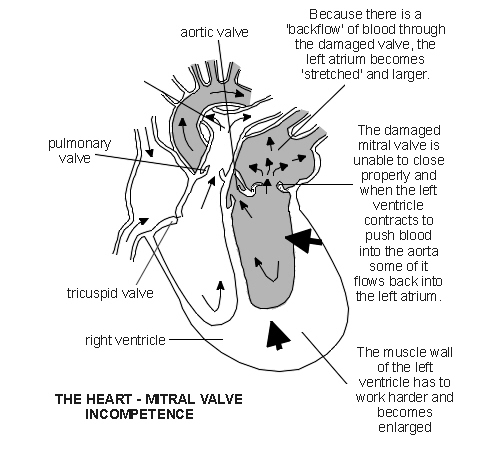Mitral regurgitation
Peer reviewed by Dr Colin Tidy, MRCGPLast updated by Dr Hayley Willacy, FRCGP Last updated 23 Oct 2023
Meets Patient’s editorial guidelines
- DownloadDownload
- Share
- Language
- Discussion
In this series:Heart valve diseaseMitral stenosisAortic stenosisAortic regurgitationInfective endocarditis
The mitral valve is a heart valve that lies between the left atrium and left ventricle.
In this article:
Video picks for Heart disease
The heart - mitral valve incompetence

Continue reading below
What is mitral regurgitation?
Mitral regurgitation is sometimes called mitral insufficiency or mitral incompetence. In mitral regurgitation the valve does not close properly. This causes blood to leak back (regurgitate) into the left atrium when the left ventricle squeezes (contracts). Basically, the more open the valve remains, the more blood regurgitates and the more severe the problem.
Mitral valve prolapse
This is also called floppy mitral valve. In this condition the valve is slightly deformed and bulges back into the left atrium when the ventricle contracts. This can let a small amount of blood leak back into the left atrium.
As many as 1 in 10 people have some degree of mitral valve prolapse. It becomes common with increasing age. It usually causes no symptoms, as the amount of blood that leaks back is often slight.
What causes mitral regurgitation?
Back to contentsSometimes regurgitation is rarely caused by congenital structural deformity of or damage to the leaflets, chordae, and/or papillary heart muscles. It sometimes occurs with connective tissue disorders such as Marfan's syndrome, systemic lupus erythematosus or Ehler's-Danlos syndrome.
Rheumatic heart disease is very common in the developing world and is a common cause of mitral regurgitation worldwide.
Continue reading below
Mitral regurgitation symptoms
Back to contentsMild mitral regurgitation may not cause any symptoms. However the symptoms associated with more severe mitral regurgitation include:
Shortness of breath, especially with activity or when you lie down.
Swollen ankles (oedema).
Mitral regurgitation treatment
Back to contentsMild cases may not require any regular medication. Although medicines cannot correct mitral regurgitation, some medicines may be prescribed to help ease symptoms, or to help prevent complications by managing your blood pressure - for example, angiotensin-converting enzyme (ACE) inhibitors, 'water tablets' (diuretics) and anticoagulation medication.
If you develop atrial fibrillation, several medicines can be used to slow the heart rate down.
Surgical treatment
Surgical treatment is sometimes needed. Recent guidelines favour surgery at an earlier stage than used to be the case. The best option for you will depend on your particular circumstances.
Valve repair may be an option in some cases.
Valve replacement is needed in some cases. This may be with a mechanical or a tissue valve. Mechanical valves are made of materials which are not likely to react with your body, such as titanium. Tissue valves are made from treated animal tissue, such as valves from a pig.
Some surgical options may be possible through a catheter into the femoral vein. This avoids open heart surgery.
Recent guidelines favour replacement rather than repair in many cases. If you need surgery, a surgeon will advise on which is the best option for your situation.
Continue reading below
What is the outlook for people with mitral regurgitation?
Back to contentsIn some cases, the disorder is mild and causes no symptoms. If you develop symptoms they tend to become gradually worse over the years. Typical complications include heart failure, pulmonary artery hypertension, atrial fibrillation and stroke. However, the speed of decline can vary. In many cases, it can take years for symptoms to become serious. Doctors use indications of how serious these complications are to decide when the best time is to refer for possible surgery. For example, when the pressure in the pulmonary artery rises above 60mmHg during exercise testing. Medication can ease symptoms but cannot repair a damaged valve.
Surgical treatment has greatly improved the outlook in most people with more severe regurgitation. Surgery has a very good success rate.
Patient picks for Heart disease

Heart health and blood vessels
Cardiovascular health risk assessment
A cardiovascular health risk assessment provides an accurate estimate of your risk of developing cardiovascular disease (eg, angina, heart attack, stroke or peripheral arterial disease) over the following 10 years, and provides an opportunity for you to make any changes that will reduce this risk. If you already have a cardiovascular disease or diabetes then your risk does not need to be assessed because you are already in the high-risk group.
by Dr Colin Tidy, MRCGP

Heart health and blood vessels
Heart disease
The heart is a muscle pump located in the chest, which pumps blood around the body. It keeps pumping from a few weeks after conception until we die. There are a number of different conditions that can affect how the heart works.
by Dr Rachel Hudson, MRCGP
Further reading and references
- Prophylaxis against infective endocarditis: Antimicrobial prophylaxis against infective endocarditis in adults and children undergoing interventional procedures; NICE Clinical Guideline (March 2008 - last updated July 2016)
- Nishimura RA, Otto CM, Bonow RO, et al; 2017 AHA/ACC Focused Update of the 2014 AHA/ACC Guideline for the Management of Patients With Valvular Heart Disease. Circulation. 2017; CIR.0000000000000503. Originally published March 15, 2017.
- Heart valve disease presenting in adults: investigation and management; NICE guideline (November 2021)
- Girdauskas E, Pausch J, Harmel E, et al; Minimally invasive mitral valve repair for functional mitral regurgitation. Eur J Cardiothorac Surg. 2019 Jun 1;55(Suppl 1):i17-i25. doi: 10.1093/ejcts/ezy344.
- Aluru JS, Barsouk A, Saginala K, et al; Valvular Heart Disease Epidemiology. Med Sci (Basel). 2022 Jun 15;10(2):32. doi: 10.3390/medsci10020032.
Continue reading below
Article history
The information on this page is written and peer reviewed by qualified clinicians.
Next review due: 5 Sept 2028
23 Oct 2023 | Latest version

Ask, share, connect.
Browse discussions, ask questions, and share experiences across hundreds of health topics.

Feeling unwell?
Assess your symptoms online for free
Sign up to the Patient newsletter
Your weekly dose of clear, trustworthy health advice - written to help you feel informed, confident and in control.
By subscribing you accept our Privacy Policy. You can unsubscribe at any time. We never sell your data.